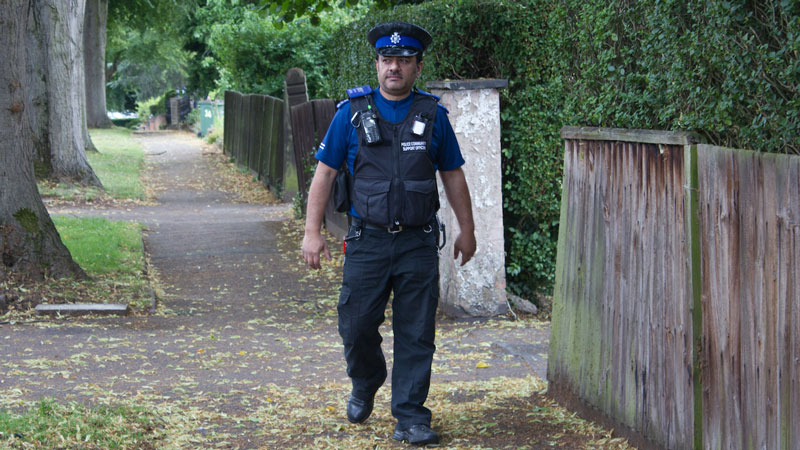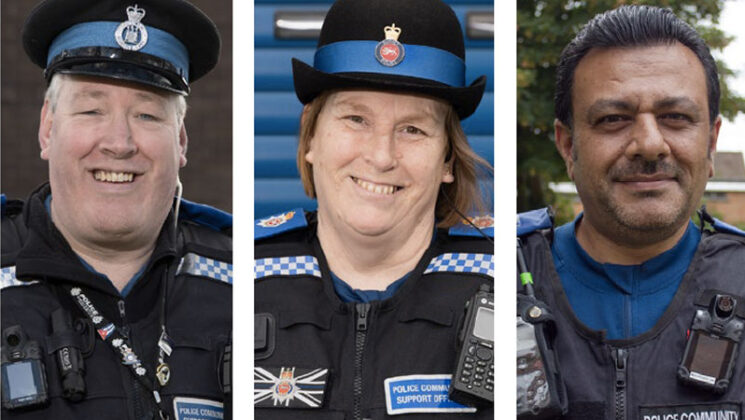On 24 July 2002, the Police Reform Act introduced the role of the police community support officer (PCSO). The Metropolitan Police in London created the first PCSOs the same year, with other forces quickly following.
PCSOs work in all forces in England and Wales, but not for Police Scotland or the Police Service of Northern Ireland. Unlike police officers, PCSOs can join a trade union, and nearly 70% of them are UNISON members.
Rooted in local areas, PCSOs provide a vital police presence. They deter anti-social behaviour, provide reassurance, gather intelligence and work with businesses, schools and statutory partners to keep communities safe.
People welcome their visibility, their in-depth knowledge of local areas and their approachability. The PCSO role attracted the highest proportion ever of Black, Asian and minority ethnic new joiners to policing.
Government must commit to the PCSO workforce
Commenting on the 20th anniversary, UNISON national officer for police and justice Ben Priestley says: “This is a time to reflect on what communities want from police forces going forward.
“At their peak in 2009 there were 16,814 PCSOs, but today that number has fallen to 9,284 – a decline of 46%. One force, Norfolk, has abolished the role in its entirety.
“These cuts are the result of the government austerity measures which were forced on police forces in England following the 2010 general election. By contrast, the Welsh government has maintained funding and PCSO numbers across all its four forces.
“So, this anniversary, UNISON is calling on the UK government, MPs, chief constables, police and crime commissioners and elected mayors, to commit to support the PCSO workforce for the next 20 years – with the additional funding needed to rebuild PCSO numbers in England.”

“WE were pioneers.” That’s how Chris Moyes (pictured above) remembers feeling, as part of the first ever intake of PCSOs in Surrey Police, in 2003.
She and her fellow newcomers had a brief, of course, with the emphasis on being ever-present in the community, “the link between the community and the police officers, the eyes and ears on the street.”
But she says that everyone, employers and recruits, were feeling their way towards how that would work in practice. To an extent, the PCSOs could “make the role what we wanted it to be.”
Chris laughs, because there was another way in which they were pioneers. “When we first started, people thought we were parking attendants, so that was a bit difficult. We used to have to explain what we did.”

Like Chris, Nad Ikram (above) is fast approaching his 20th anniversary as a PCSO, in his case with Leicestershire Police. And he remembers the same sense of potential in his new job.
“It was a brand new role and so there was a lot of curiosity. There was a lot of media attention too, because David Blunkett, who was the home secretary responsible for creating the Police Reform Act, said we needed more visible policing on the streets, like the beat bobby of the old days, the Dixons of Dock Green.
“At that time, we had a PCSO/traffic warden manager. And he said, ‘It’s a new role, we want you to develop it’. For us, it was a massive blank canvas. It was an opportunity to say, ‘OK, let’s start shaping the future’.”
Over the years, people have been drawn to the role from different avenues of life, both from within police services – a common entry was as a police traffic warden – and outside.
Chris had served in the army, as a health assistant in the Queen Alexander’s Royal Army Nursing Corps, then worked as a residential social worker in a children’s home, then briefly as a police traffic warden before the PCSOs were created. Nad had been responsible for the administration and accounts for an IT company.

Matt Newman (above), a comparative newbie as a five-year PCSO, had already been with Suffolk Police for many years as a public inquiry officer, covering the front desk at a police station in Suffolk. While Chris and Nad were intrigued by a new opportunity, Matt’s move was prompted by a familiar problem: cuts. In 2016 all of Suffolk Constabulary’s rural stations were closed and their inquiry officers made redundant.
“We all scrambled around to try to find new roles. I actually worked for about 11 months, in the HR department at headquarters. But that just wasn’t for me. I wanted to get back to something that was dealing with the public. When the PCSO role came up, for an intake of about eight or nine new PCSOs, I jumped at the chance.”
Working with the community
Though their backgrounds are very different, what connects Chris, Nad and Matt, and probably all PCSOS, has been the keen desire to work with people, in the community.
“For me, it was really important that we do embed within our communities,” says Nad. “I’ve been in my area now for 19 years. It’s allowed people to get to know me, personally. And that is really important, because when you get to know people on a long-term basis, it creates confidence, it creates trust, and it’s much easier to have the difficult conversations.
“So, for example, if there are community tensions, the local PCSOs can come in and give a different perspective on what’s happening and work with the community to alleviate those tensions.”
Nad’s patch is the town of Oadby, just outside Leicester, which he describes as a diverse, affluent area with a significant Asian population and a mix of communities including Sikh, Muslim, Hindu, as well as Christian. Nad, who is British Muslim of Pakistani origin, engages with all of them.
“I’ve had the opportunity to work with so many cultural and religious groups. I’m a Muslim officer, I work for Leicestershire Police, but I go into the Sikh temple and everybody knows me there. It doesn’t matter who you are, what your background is, it’s all about having that understanding and that cultural awareness about your area. And once you have that, it makes the job a lot easier.”
Nad also speaks enthusiastically about the “beat surgeries” he conducts in a local library, and the way that he and his fellow PCSOs use social media to showcase their work and engage with the community.
‘People just call me Chris’
With her army background, Chris has an interesting perspective on the difference between police officers and PCSOs.
“We don’t have handcuffs or ASP [batons] or gas or anything like that. I think that helps to break down some barriers, because we’re non-threatening. And we have the time to listen to people, hear what they have to say.
“So we’re walking the beat and people get to know you. People just call me Chris and they forget I even work for the police. And I’ll get told all sorts of stuff.”
She works in Guildford town centre, with some residential on top, and over the years has connected with local people in a variety of ways – whether organising football tournaments for kids, starting a “little shrubs club” in a disused car park, or advising on crime prevention (notably scams) from a table at the farmers market.
Chris also exercises crime prevention herself, her mere presence deterring drunks and thieves from the market.
“We have citizen’s arrest. And we can enforce stuff, like the public spaces protection order – no drinking alcohol from an open vessel in the street. If street drinkers see me coming they’ll either scarper or put it in the bin before I even get to them, because they know me.”
An ever-widening role
In Suffolk, Matt is part of a safe neighbourhood team consisting of three PCSOs, a handful of PCs and two sergeants, covering an area of some 385 square miles. Matt himself is the PCSO for the town of Halesworth, a number of rural parishes around it, and the seaside town of Southwold.
“I enjoy the variety, the fact that no two days are ever the same. And it’s that pulling together as a team, to try to provide the best service for the public,” he says.
But these days that involves much more than walking the community. A day starts with responding to calls into the control room, from people asking for help or advice, or to report a crime. If a crime has been reported, he has to record it, in order to facilitate an investigation; sometimes he may start that investigation himself, if it involves house calls or CCTV inquiries, before passing it onto a police officer. He also conducts reassurance patrols, in areas where members of the community have specific concerns; and he liaises with other agencies, such as housing and mental health teams, for example around antisocial behaviour.
Chris suggests that the PCSO role is not quite as “non-conflict” as many think. “That’s something we are trying to get changed, actually: they still advertise PCSOs as a non-conflict role, but it is conflict. You don’t know what you’re gonna walk into. You might walk around a corner and be threatened with a broken vodka bottle. I once had someone who had a machete at the door. I said, ‘You’ve got a machete’, and they said, ‘Yeah, I’ve got three of those.’”
Matt once found himself in a tough spot when he came to the assistance of a PC colleague. “It was being broadcast on the radio, a lady in mental health distress, who was threatening to stab someone or cut herself. In no way, shape or form should a PCSO be deployed to an incident where a weapon is being brandished. But at the time, the only PC who was available to go was a single female officer. My conscience wouldn’t allow me to not try and back her up.”
Chris’s machete owner also suffered from mental health issues. In both cases the PCSO knew the individual already, their familiarity helping to diffuse the situation. But those incidents back up Matt’s assertion that too much PCSO time nowadays involves dealing with vulnerable people who are not being supported by over-stretched mental health services.
Under-resourced
And that’s just one additional burden to a role that is under severe pressure from falling staff numbers – both in PCSOs and police officers.
By all accounts, Norfolk’s decision to scrap its entire PCSO workforce is not typical. Nad, Chris and Matt all speak of the value placed on PCSOs by their chief officers. Nevertheless, in 2018 Suffolk cut its PCSOs by 78%, from 173 to 48, which Matt says was budgetary-driven. “Their hands are tied.”
At the same time, the country-wide problem in retaining demoralised police officers means that many of their duties are being handed to PCSOs, such as the incredibly time-consuming business of witness statements. “They can take hours,” says Chris. “All the time you’re taking someone’s statement is less time on the streets.”
For Matt, too, there’s far less time nowadays to patrol his neighbourhood, especially given the challenges of a rural beat.
Nevertheless, the commitment of PCSOs like Nad, Chris and Matt is testimony to the continued need for PCSOs, especially where they are most effective – in the community.
Chris has won a local mayor’s award for community service and was once nominated by residents for a local heroes award. “I like my community,” she says. “If you can put a smile on a victim’s face, if you can have a positive impact on someone’s life, well there’s nothing wrong with that, is there?”
Photos of Chris Moyes and Matt Newman by Ralph Hodgson



